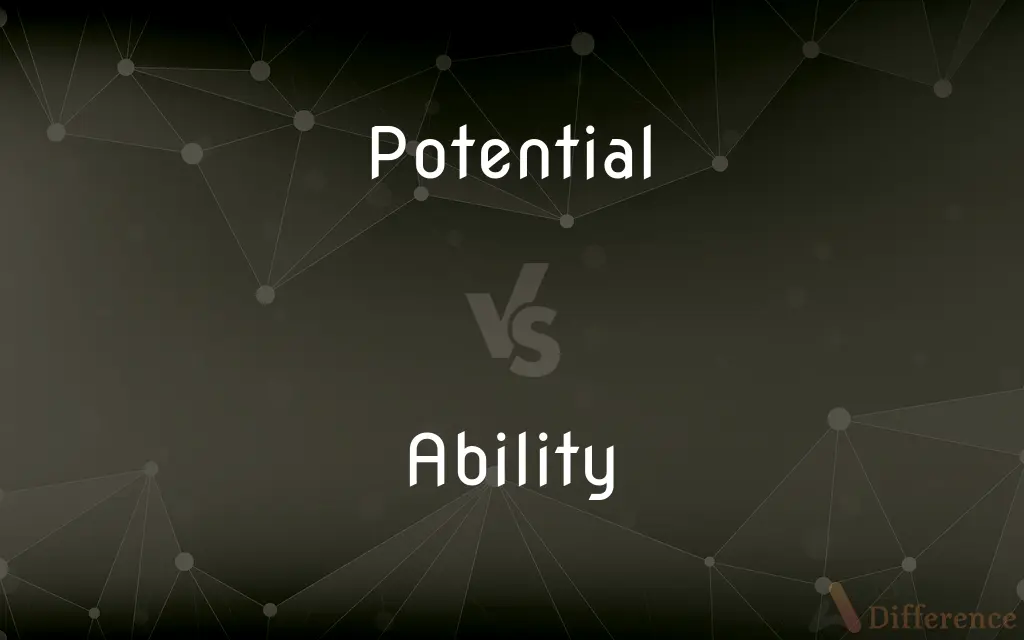Potential vs. Ability — What's the Difference?
Edited by Tayyaba Rehman — By Maham Liaqat — Updated on March 19, 2024
Potential refers to the capacity to develop skills or achieve in the future, often unrealized. Ability is the current skill level or competence to perform tasks.

Difference Between Potential and Ability
Table of Contents
ADVERTISEMENT
Key Differences
Potential indicates an individual's or entity's capacity to grow, develop, or achieve more in the future, highlighting untapped or latent qualities. It is often used to suggest that, with the right conditions, significant improvement or success is possible. Ability, on the other hand, reflects the current level of skill, competence, or talent that an individual or entity possesses, demonstrated through performance or achievements.
While potential is forward-looking and speculative, based on qualities that can lead to future success, ability is observable and measurable in the present. For example, a student may have the potential to become a great scientist due to their curiosity and intelligence, whereas another student's ability in science is demonstrated by their current achievements and understanding of the subject.
The realization of potential into actual ability requires factors such as effort, training, and opportunity. Someone might have high potential in a sport due to physical attributes like height or strength, but it's their ability, honed through practice and competition, that ultimately determines their performance level.
Assessing potential is often subjective, involving predictions about future capabilities and achievements based on current indicators. Assessing ability, however, tends to be more objective, based on concrete evidence of what an individual or entity can currently do.
Potential can be seen as a promise of future achievement, inspiring investment in development and growth. Ability, by contrast, is the actualization of that promise, manifesting as tangible skills or accomplishments. Both concepts are crucial in fields such as education, sports, and business, where identifying and developing both potential and ability are key to success.
ADVERTISEMENT
Comparison Chart
Definition
The capacity to develop skills or achievements in the future
The current level of skill or competence to perform tasks
Nature
Latent, unrealized
Observable, measurable
Time Orientation
Future-oriented, speculative
Present-oriented, demonstrable
Realization
Requires effort, training, and opportunity for development
Demonstrated through current performance or achievements
Measurement
Subjective, based on qualities that suggest future success
Objective, based on evidence of current capabilities
Compare with Definitions
Potential
Unrealized ability awaiting development.
With proper training, his potential in mathematics could be immense.
Ability
The power to perform a task effectively.
The team's ability to work under pressure led to the project's success.
Potential
The possibility of achieving more in the future.
She has the potential to lead the project, given her innovative ideas.
Ability
Skill or competence in a specific area.
Her ability to solve complex problems is unmatched.
Potential
Future-oriented promise of achievement.
The potential of renewable energy technologies is yet to be fully realized.
Ability
Demonstrated talent or skill.
His musical abilities have earned him several awards.
Potential
Capacity for growth or improvement.
This startup has significant growth potential in the tech industry.
Ability
A developed talent or skill set.
Enhancing your linguistic abilities can open many career doors.
Potential
Latent qualities or abilities that may be developed.
The young athlete shows great potential for the Olympic Games.
Ability
Actual skill as opposed to potential.
His ability to communicate complex ideas clearly makes him an excellent teacher.
Potential
Potential generally refers to a currently unrealized ability. The term is used in a wide variety of fields, from physics to the social sciences to indicate things that are in a state where they are able to change in ways ranging from the simple release of energy by objects to the realization of abilities in people.
Ability
Possession of the means or skill to do something
The manager had lost his ability to motivate the players
Potential
Capable of being but not yet in existence; latent or undeveloped
A potential problem.
A substance with many potential uses.
Ability
Talent, skill, or proficiency in a particular area
Pupils of all abilities
A man of exceptional ability
Potential
(Grammar) Of, relating to, or being a verbal construction with auxiliaries such as may or can; for example, it may snow.
Ability
The quality of being able to do something, especially the physical, mental, financial, or legal power to accomplish something.
Potential
The inherent ability or capacity for growth, development, or future success
An investment with a lot of potential.
A singer who has the potential to become a major star.
Ability
A skill, talent, or capacity
A student of many abilities.
Potential
The possibility that something might happen or result from given conditions
A tense situation with the potential to turn into a riot.
Farming practices that increase the potential for the erosion of topsoil.
Ability
The quality of being suitable for or receptive to a specified treatment
The ability of a computer to be configured for use as a file server. See Usage Note at able.
Potential
See electric potential.
Ability
(obsolete) Suitableness.
Potential
See gravitational potential.
Ability
(uncountable) The quality or state of being able; capacity to do or of doing something; having the necessary power.
This phone has the ability to have its software upgraded wirelessly.
This wood has the ability to fight off insects, fungus, and mold for a considerable time.
Potential
See magnetic potential.
Ability
The legal wherewithal to act.
Potential
(Grammar) A potential verb form.
Ability
Physical power.
Potential
Currently unrealized ability (with the most common adposition being to)
Even from a young age it was clear that she had the potential to become a great musician.
Ability
(archaic) Financial ability.
Potential
(physics) The gravitational potential: the radial (irrotational, static) component of a gravitational field, also known as the Newtonian potential or the gravitoelectric field.
Ability
(uncountable) A unique power of the mind; a faculty.
Potential
(physics) The work (energy) required to move a reference particle from a reference location to a specified location in the presence of a force field, for example to bring a unit positive electric charge from an infinite distance to a specified point against an electric field.
Ability
(countable) A skill or competence in doing; mental power; talent; aptitude.
They are persons of ability, who will go far in life.
She has an uncanny ability to defuse conflict.
A mixed-ability class
Potential
(grammar) A verbal construction or form stating something is possible or probable.
Ability
The quality or state of being able; power to perform, whether physical, moral, intellectual, conventional, or legal; capacity; skill or competence in doing; sufficiency of strength, skill, resources, etc.; - in the plural, faculty, talent.
Then the disciples, every man according to his ability, determined to send relief unto the brethren.
Natural abilities are like natural plants, that need pruning by study.
The public men of England, with much of a peculiar kind of ability.
Potential
Existing in possibility, not in actuality.
Ability
The quality of being able to perform; a quality that permits or facilitates achievement or accomplishment
Potential
(archaic) Being potent; endowed with energy adequate to a result
Ability
Possession of the qualities (especially mental qualities) required to do something or get something done;
Danger heightened his powers of discrimination
Potential
(physics) A potential field is an irrotational (static) field.
Potential
(physics) A potential flow is an irrotational flow.
Potential
(grammar) Referring to a verbal construction of form stating something is possible or probable.
Potential
Being potent; endowed with energy adequate to a result; efficacious; influential.
Potential
Existing in possibility, not in actuality.
Potential existence means merely that the thing may be at ome time; actual existence, that it now is.
Potential
Anything that may be possible; a possibility; potentially.
Potential
In the theory of gravitation, or of other forces acting in space, a function of the rectangular coordinates which determine the position of a point, such that its differential coefficients with respect to the coördinates are equal to the components of the force at the point considered; - also called potential function, or force function. It is called also Newtonian potential when the force is directed to a fixed center and is inversely as the square of the distance from the center.
Potential
The energy of an electrical charge measured by its power to do work; hence, the degree of electrification as referred to some standard, as that of the earth; electro-motive force.
Potential
The inherent capacity for coming into being
Potential
The difference in electrical charge between two points in a circuit expressed in volts
Potential
Existing in possibility;
A potential problem
Possible uses of nuclear power
Potential
Expected to become or be; in prospect;
Potential clients
Expected income
Common Curiosities
Is ability fixed, or can it be improved?
While some abilities might be more innate, most can be significantly improved with practice, education, and experience.
Can potential be measured accurately?
Measuring potential is more speculative and subjective than measuring ability, as it involves predicting future success based on current indicators and conditions.
How do employers assess potential during hiring?
Employers may assess potential through interviews, assessments, and references, looking for qualities that indicate the candidate's capacity for growth and future success.
How does potential differ from talent?
Potential refers to the capacity for future development or achievement, while talent is a natural aptitude or skill. Talent can be seen as a component of one's potential.
What role does motivation play in converting potential into ability?
Motivation is crucial as it drives the effort and commitment needed to develop skills and realize one's potential.
How can someone realize their potential?
Realizing potential typically requires effort, training, the right opportunities, and sometimes mentorship or guidance to develop latent abilities into actual skills.
Why is it important to distinguish between potential and ability?
Distinguishing between them is crucial for development and growth strategies, whether in education, career planning, or personal development, to invest resources wisely.
Does potential always translate into ability?
Not always; realizing potential into actual ability requires suitable conditions, effort, and sometimes luck.
Can someone have high potential but low ability in an area?
Yes, an individual can have high potential in an area but currently low ability if they have not yet developed the necessary skills or knowledge.
How does one's environment impact their potential and ability?
An individual's environment can significantly influence both by either providing or limiting opportunities for growth, learning, and skill development.
How can individuals assess their own potential?
Self-assessment, feedback from others, trying new activities, and reflecting on personal interests and successes can help individuals gauge their potential.
Can lack of opportunity affect the realization of potential?
Yes, without the right opportunities, resources, or support, an individual's potential may remain unrealized, underscoring the importance of creating enabling environments.
How do educators nurture potential in students?
Educators nurture potential by providing challenging, supportive, and engaging learning environments that encourage exploration and skill development.
Is potential always related to professional or academic fields?
No, potential can relate to any aspect of life, including personal development, hobbies, social skills, and more.
Can abilities decline over time?
Yes, without practice or due to aging and other factors, abilities can decline, highlighting the need for continual development.
Share Your Discovery

Previous Comparison
Ng vs. Nang
Next Comparison
Z vs. WAuthor Spotlight
Written by
Maham LiaqatEdited by
Tayyaba RehmanTayyaba Rehman is a distinguished writer, currently serving as a primary contributor to askdifference.com. As a researcher in semantics and etymology, Tayyaba's passion for the complexity of languages and their distinctions has found a perfect home on the platform. Tayyaba delves into the intricacies of language, distinguishing between commonly confused words and phrases, thereby providing clarity for readers worldwide.














































